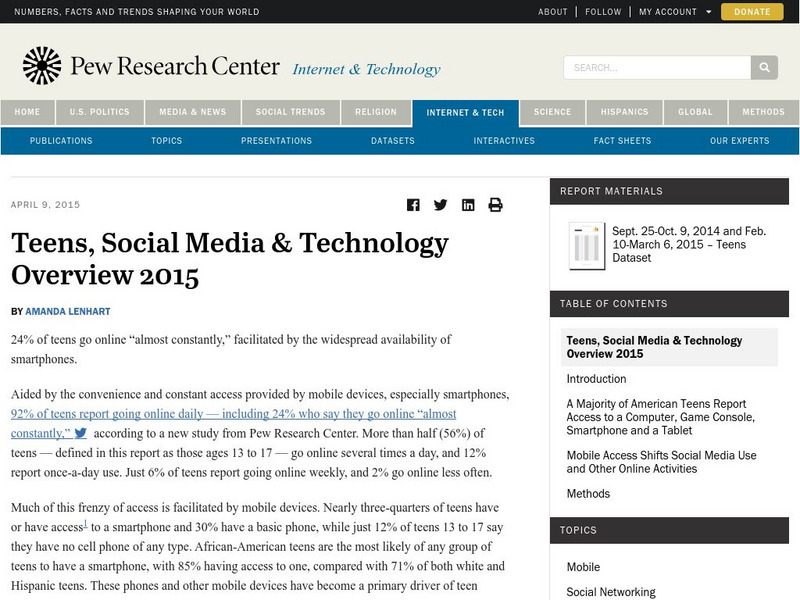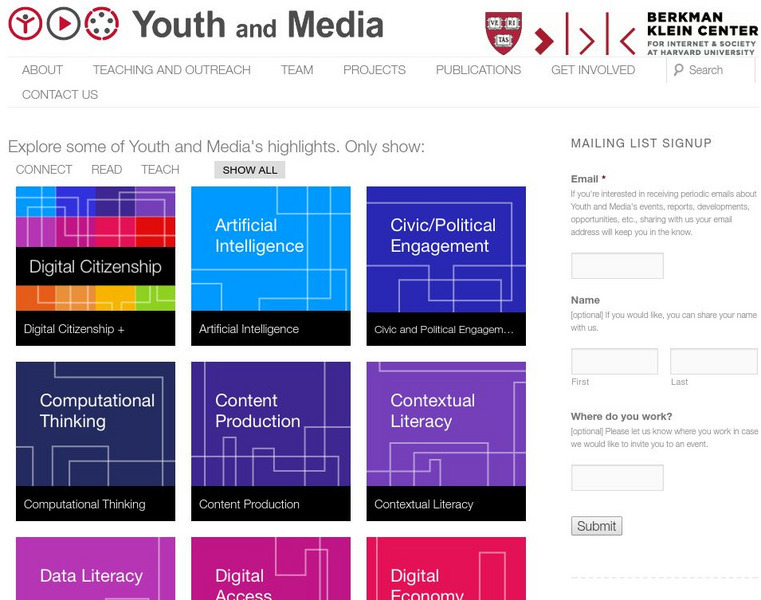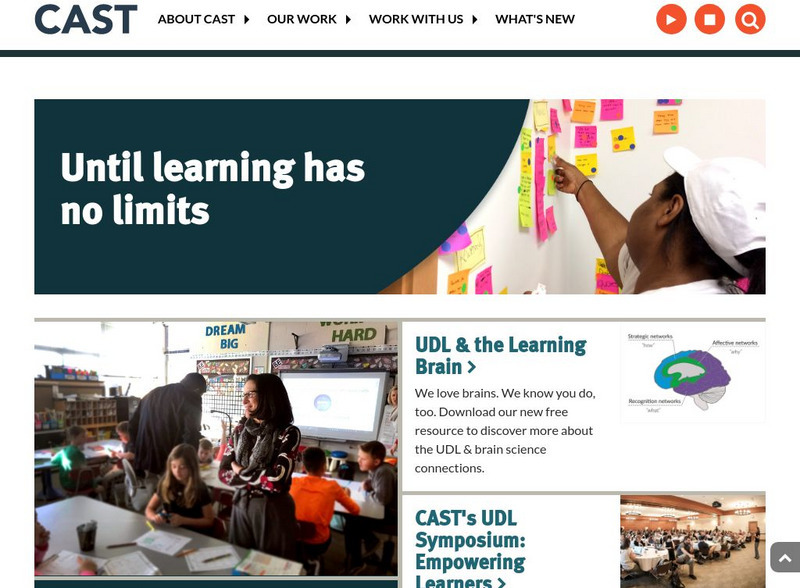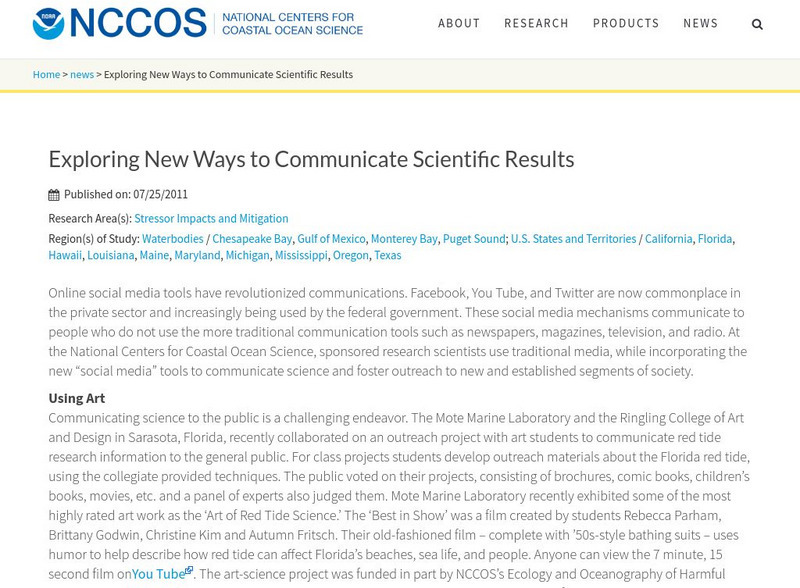National Institutes of Health
Paediatrics & Child Health: Impact of Media Use on Children and Youth
This article from Paediatrics & Child Health provides research about how television, radio, music, video games and the Internet impact media on children and youth.
PBS
Pbs Learning Media: Center Card: Build an Animal Habitat
Children design an animal habitat and talk about how the habitat provides the animal's basic needs -- shelter, water, and food -- using this block center activity. It includes three resources.
University of Illinois
University of Illinois Urbana Champaign: Asian Educational Media Service
A tremendous resource for finding sites, multimedia, and other resources for teaching about or studying Asian countries. Search by country, media type, or grade level. Includes lesson plans and links to great online resources.
Pew Research Center
Pew Research Center: Teens, Social Media & Technology Overview 2015
Discusses the findings from a research study on how teens use popular social media and social networking sites. The study looked at the different sites, tools, and apps that are being used, with Facebook ranking the highest. It also...
Other
Center for Media Literacy: Best Practices
Best Practices encompasses the best of media literacy education - the instructional tools and techniques that teachers use to organize their classes, create engaging activities and accomplish their learning objectives. Explore this...
New York University
Center for Religion and Media: The Revealer
The Revealer blogs about religious issues of the day and how the press covers them. Includes a useful selection of links to a wide range of religion news resources (including other blogs).
Education Development Center
Education Development Center, Inc.: Tv411: Reading the Fine Print
An interactive three-part lesson on how fine print is used in advertising. In part one students read three advertisements and determine which details from the ads are important and which are not. In part two students read six...
University of North Carolina
University of North Carolina: Writing Center: Handouts: Evidence
What kinds of evidence best support the points you make in a paper? Where can you find the evidence you need? This handout answers all these questions and more, including the difference between primary and secondary sources. You'll also...
Other
Berkman Center for Internet & Society: Confronting Online Challenges
Youth and Media focuses on the challenges young people face when accessing the Internet. Website addresses online safety, privacy, information quality and civic participation. Includes links to ongoing projects, publications and ways for...
PBS
Pbs Learning Media: Daniel Tiger's Neighborhood: Collection
This Daniel Tiger's Neighborhood collection emphases social-emotional development and academic success. Research tells us that for children to be successful in school, they must be mentally healthy and they must have good interpersonal...
University of Utah
University of Utah: Genetic Science Learning Center: What Is Cloning?
Media-rich detailed description of modern cloning technology and the two different processes used: artificial embryo twinning and somatic cell nuclear transfer.
John F. Kennedy Center
The Kennedy Center: Multi Media Hero Analysis
Using what they learn about how heroes are depicted in art, literature, and music, young scholars create their own definition of a hero, and then write an essay based on a hero they wish to research.
Other
The Center for Applied Special Technology (Cast)
CAST is an educational non-profit organization that uses technology to expand opportunities for all people. Their goal is to produce innovative learning technologies based on their research. Learn more about integrating and applying this...
Other
Center on Alcohol Marketing and Youth
The Center on Alcohol Marketing and Youth reports on the marketing practices of alcohol producers and on the dangers of underage drinking. Resources include an overview of alcohol marketing (also available in Spanish), examples of print...
PBS
Pbs Learning Media: An Educator's Guide to Expanding Narratives About American History & Culture
This collection has been carefully selected by New York City educator and curriculum consultant Vivett Dukes to showcase ideas, achievements, and contributions by American people of all backgrounds across eras. The content highlighted...
NOAA
Noaa: Nccos: Exploring New Ways to Communicate Scientific Results
Discusses the many types of media technology that scientists have available today to communicate the results of their research. These include social media tools, educational web pages, videos, virtual worlds, and podcasts. Many examples...
John F. Kennedy Center
The Kennedy Center: Migrant Workers Through the Lens of Dorothea Lange
Using song lyrics and Dorothea Lange's photographs, students will explore the hardships migrant workers faced during the Great Depression.
PBS
Pbs Learning Media: How Big Is Our Universe?
This interactive resource from Harvard Smithsonian Center for Astrophysics uses images and activities to understand the scope and scale of our universe. Featured are technologies used by generations of explorers.
PBS
Pbs Learning Media: Some Genes Are Dominant
This interactive activity, adapted from the Dolan DNA Learning Center, illustrates how Gregor Mendel used purebred yellow and green peas to show that some genes are dominant and others are recessive.
PBS
Pbs Learning Media: Greenland Ice Sheet Project 2: A Record of Climate Change
Using images and graphs, this interactive resource illustrates scientists' efforts to study Earth's climatic history for the last 250,000 years by drilling into the Greenland Ice Sheet and examining ice cores. Includes background reading...
PBS
Pbs Learning Media: Mendel's Laws of Genetic Inheritance
This interactive activity, adapted from the Dolan DNA Learning Center, uses Punnett squares to illustrate Mendel's laws of inheritance and how a particular gene combination results in a 3-to-1 ratio of dominant-to-recessive traits.
PBS
Pbs: Math With Jake: Transposition Using Ratios
Composer and ukulele artist Jake Shimabukuro describes the concept of transposing notes in music and how ratios are applied in this video from Center for Asian American Media. Shimabukuro explains how to transpose music written in the...
Other
Silicon Valley Art Museum
From the center of America's high-tech industry, the Silicon Valley Art Museum showcases the talents of artists-- past, present, and future-- who explore the connections between art and technology. Through a variety of high-interest...
Other
Silicon Valley Art Museum
From the center of America's high-tech industry, the Silicon Valley Art Museum showcases the talents of artists-- past, present, and future-- who explore the connections between art and technology. Through a variety of high-interest...














